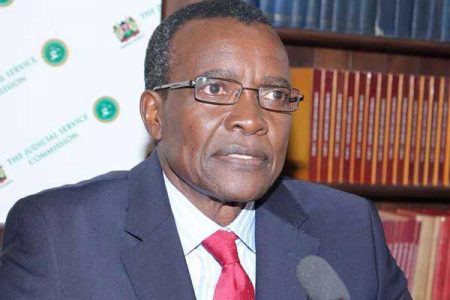NAIROBI, (Reuters) – Kenya’s Supreme Court ruling to scrap last month’s presidential election was shaped by a new chief justice who proved a staunch defender of judicial independence on a continent where judges are often seen as being under the thumb of executive powers.
David Maraga’s declaration that the Aug. 8 election was void and demand for a new poll with 60 days shocked many in the East African nation and abroad.
But his announcement, after a 4-2 vote by a court panel to annul the vote, didn’t surprise those who know the chief justice.

“We knew this case was coming and he was the man to hear it,” Professor Tom Ojienda, who worked with Maraga and sits on the Judicial Service Commission that appointed him chief justice, told Reuters. “He is a stickler for the rules.”
President Uhuru Kenyatta, who was expected to be sworn in for a second term until Friday’s Supreme Court ruling, said he respected the decision. But he took a swipe at Maraga’s colleagues, calling them “crooks” and saying the judiciary needed fixing.
Kenya, a U.S. ally in the fight against Islamists and a trade gateway to East Africa, has a history of disputed votes. A row after the 2007 vote led to ethnic bloodshed that killed more than 1,200 people. In 2013, a bid by veteran opponent Raila Odinga to secure an election rerun was rejected by the Supreme Court.
This time, the opposition changed tack in their petition. Instead of seeking to prove enough votes were fake to undermine the vote – an almost impossible task in the two weeks the court had to give its judgement – Odinga’s supporters sought to demonstrate that the online tallying process lacked integrity.
The new approach may have been a key factor in securing a decision that had the backing of four of the panel’s six judges, who have three weeks from the ruling to publish details of their decision.
But the opposition also found in the chief justice a man ready to defend judicial powers against the highest office and unswayed by a tendency in Kenya, a nation of more than 40 ethnic groups, for voters to back fellow clans people.
Within months of his appointment in October, Maraga called out Kenyatta for telling voters on a campaign stop in Maraga’s home region of Nyamira County in April that “their son” had a job. Maraga responded that his appointment had nothing to do with the president.
Kenyatta is a Kikuyu, Kenya’s biggest ethnic group but still a minority. Odinga is a Luo, another big grouping. The chief justice is Kisii, a smaller group from Kenya’s western highlands.
Maraga also sent a clear message to national leaders on Aug. 2 that the judiciary was above the political fray.
“The emerging culture of public lynching of judges and judicial officers by the political class is a vile affront to the rule of law and must be fiercely resisted,” he said in a statement.
Maraga did not immediately issue a response to Kenyatta’s latest comments. Reuters could not reach him for comment.
Kenyans have long complained that getting any official business done requires a “kitu kidogo”, Swahili for “a little something” or bribe, a frustration that is echoed across Africa.
But Kenya has slowly rebuilt confidence in its judiciary after the post-2007 vote violence. A new constitution in 2010 demanded reforms of the judiciary and other public institutions.
Maraga, who has risen the ranks as those reforms have been implement, was known by colleagues for his strict adherence to the rules even as a young lawyer.
A devout Christian of the Seventh Day Adventist tradition, he built his practice in the Rift Valley city of Nakuru rather than to Nairobi where he where he could have secured more high profile cases and would have more easily rubbed shoulders with the rich and powerful, his colleagues said.
“If a client gave you any problem, or asked for anything that was wrong, or refused to pay, (Maraga) would just say, ‘Let him go. Other ones will come’,” said Professor Ojienda said.
Maraga’s integrity and record of strictly interpreting election procedures in past polls swayed the commission to appoint him last October, Ojienda said.
The opposition’s high hopes in 2013 that it could overturn that election result were dashed. Supreme Court judges, then led by Maraga’s predecessor Willy Mutunga, rejected their petition.
This time, even Odinga – a former prime minister who has fought and lost three presidential races including this one – seemed surprised. After listening to Friday’s ruling in court, he broke out into a broad grin and pumped his fist in the air.
Since 2013, several new judges were appointed to the Supreme Court’s seven-strong panel. Friday’s decision was backed by Maraga and two others appointed after 2013. Another, who had been on the panel in 2013, also backed the ruling. Two judges dissented, while one was ill and did not vote.
“An election is not an event, it is a process from the beginning to the end,” Maraga said before reading the ruling.
Four years earlier, the opposition had some of their arguments thrown out as they were lodged too late, while their complaints about the widespread failure of the electronic voting systems failed to convince the judges.
This time, the opposition case hinged on the election board’s failure to post online tally forms from each of the 40,883 polling stations before announcing results.
The forms were supposed to be signed by each party’s agent, as a hard-copy backup to the electronic transmission. But thousands of forms were missing from the board’s website when it announced results. A report by independent court-appointed experts found many forms lacked official stamps, signatures or serial numbers.
That was enough to convince a majority in Maraga’s panel.










